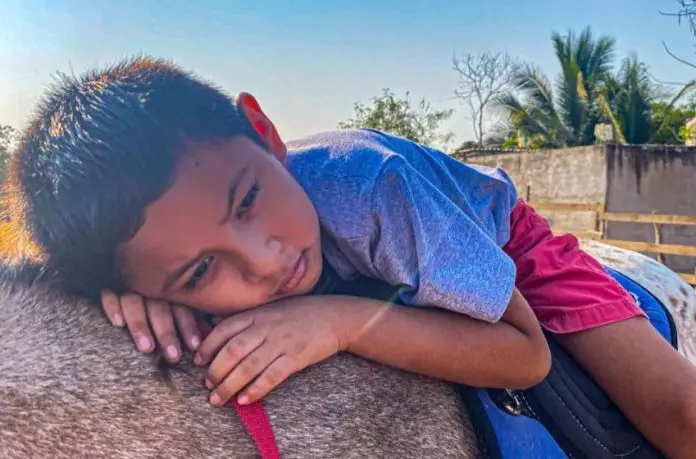Horses have been a part of my personal and professional life for over 35 years. Living part time on Eden Valley Farms, in Ontario, Canada, I first learned about equine therapy from owner Mandy Carson and her partner Toni Cromwell’s program, the HARP-Art of Whitespace. HARP stands for Human-Animal Relationship Program, and in addition, as a treatment for children and adults with disabilities, it offers nature walks and forest bathing. Carson encouraged me to open a center in Ixtapa-Zihuatanejo, Guerrero, where I have lived since 1995. I knew there was no other equine facility in my area; the only previous one had closed years ago, and the closest one was a five-hour drive away in neighboring Michoacán. In fact, equine therapy in Mexico is still something of a rarity nationwide.
It took a bit of research, but I found an online course on hippotherapy. In simple terms, equine or hippotherapy is a form of therapy in which a therapist uses a horse’s characteristic range of movements to address a human patient’s physical or mental disorders.
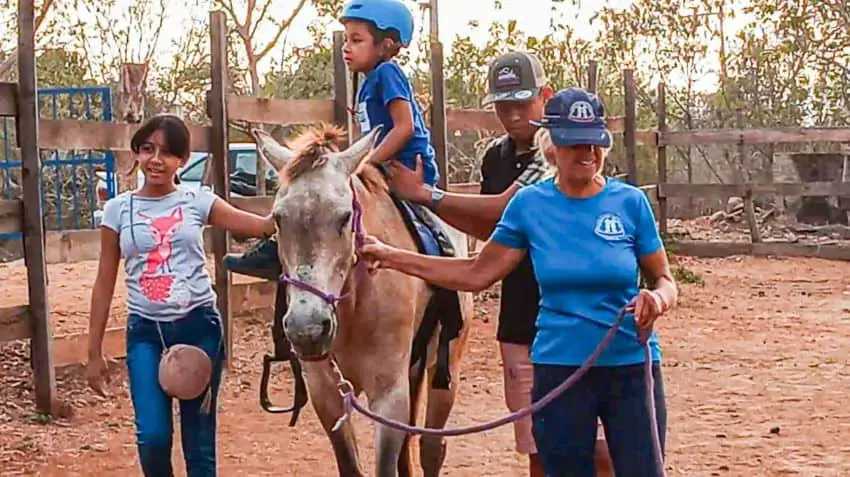
Armed with some knowledge and a burning desire to build a dream, I was fortunate to be lent land to use for the program’s first two years by the Aguilars, a local family. I gathered a group of people to build from scratch and opened The Seahorse Sanctuary and Equine Therapy Centre in Coacoyul, a small town 15 minutes outside of Zihuatanejo.
Training and courses in equine therapy available are as numerous and varied as patients’ motivation and results therapists seek to achieve, but they include names like EAL Training Centers, the Professional Association of Therapeutic Horsemanship (PATH) International, the Equine Assisted Growth and Learning Association (Eagala) and the Mexican Association of Therapeutic Riding (AMET). Many centers specialize in working with children with disabilities or special needs, primarily with issues ranging from autism to cerebral palsy, as well as emotional issues such as anxiety and trauma. Others treat professionals who suffer from PTSD due to work in high-stress situations.
Some organizations, including mine, work with seniors. Horses can serve as emotional support animals or help older people who have mobility issues due to age or medical procedures such as hip replacement surgery. With all patients, young or old, the gentle movement of the horse causes stimulation through the spinal column, which goes to the brain and affects the nerve branches. From there, this movement releases certain chemicals at the brain level, which generates stimulation in the body. The gentle movement of the horse also helps to massage the afflicted areas
There are several highly qualified centers for equine therapy in Mexico spread out across the country. Follow along to learn about four of them.
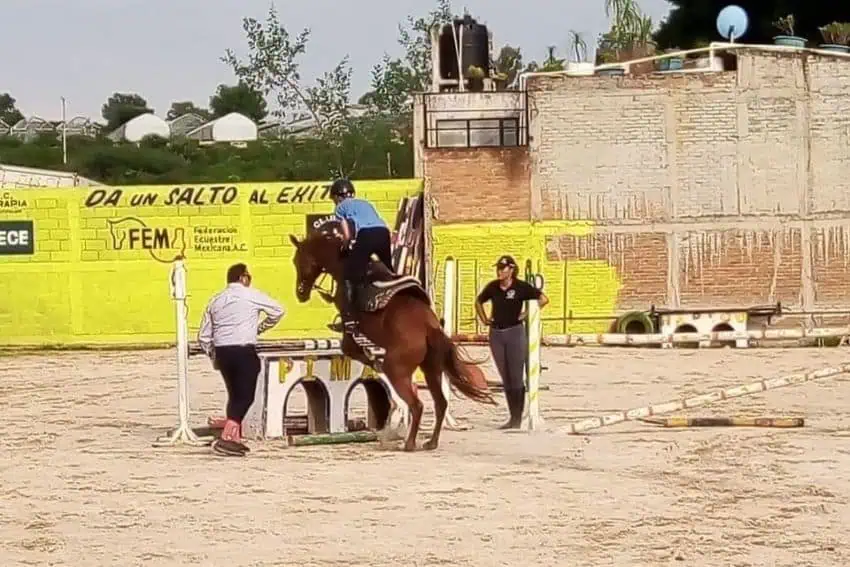
Amigos de Riendas
Amigos de Riendas para la Vida, a civil association based in Guadalajara, was founded 15 years ago by Mercedes Arámbula. Arámbula started her journey with years of horseback riding experience, a love of horses and a desire to combine that love with helping others. She was impacted personally by the birth of a nephew with a severe disability, and she began to investigate how horses could help people like him. Her research showed very little training in Mexico, so she decided to obtain her certification at the High Hopes Therapeutic Riding center in Old Lyme, Connecticut, through PATH International.
In 2010, Amigos de Riendas was established with the new team certified by the Equine Assisted Growth and Learning Association (Eagala). Today, the center boasts nine horses, 35 to 40 clients at any given time and volunteers and staff. The organization is almost completely funded by the government of Jalisco through agencies such as the Directorate for the Inclusion of Disabled Persons (DIPD) and the Social Aid System (SAS), as well as local and corporate companies and private benefactors, so that 75 percent of clients do not have to pay the 650-peso fee per class.
What made Arámbula sure this was the path for her?, “Being with horses, seeing kids grow, learn and improve is wonderful,” she says. “Seeing children walk who could not walk before, or who are now talking, is why I do what I do. And working with the children and their families for years is very special and rewarding.”
Crece
Further research took me to Michoacán, where I spoke to founder Carolina Escobedo of Crece, a non-profit in Morelia, Michoacán. Escobedo, a special education teacher who graduated from the University of Puebla, has extensive horse experience and a love of competition, which makes her approach slightly different from most centers, although equally effective: Escobedo believes in incorporating sporting events as part of therapy.
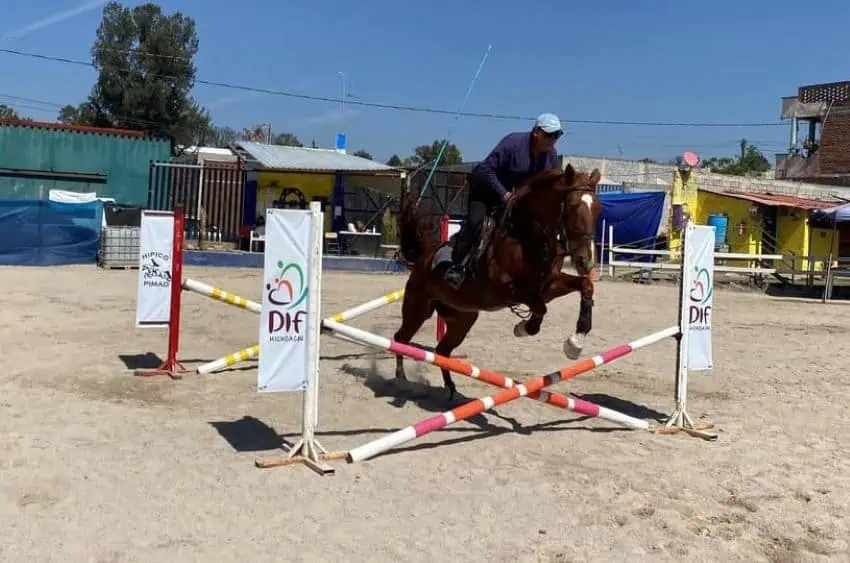
“These kids can learn to ride and there is no reason why they can’t learn to jump too,” she told me. “Especially the kids with autism. And future plans and a possible source of revenue would be hosting competitions for kids with autism. We want them to feel as if they can achieve something. That there is something they can be good at and excel in. And so we do more than just physiotherapy: we do sports.”
Therapy and courses can start for children at three years of age and continue to classes for adolescents aged 12 to 17 and beyond. In operation for eight years, Crece’s 80 students mainly come from Morelia and the many surrounding towns. Courses range in cost and are dependent on income. Some students pay full price, while others pay only 50 per cent or nothing.
“The government does not help much, although the family services agency (DIF)at the state level does give them some money,” Escobsays. “But applying for it is a lot of work. To keep afloat we have other businesses such as buying and selling horses.”
Equinoterapia SMA
Jean Gerber has had a love affair with horses for much of her adult life, and San Miguel de Allende is where she can feed her passion. A friend told her about a relative who had severe neurological issues and how the only thing that helped him was the equine therapy classes he was taking. “It planted a seed,” Gerber said, leading her to investigate everything she could about equine therapy.
Gerber teamed up with fellow horse enthusiast and therapist Lisa Attridge de Gordillo, who also owns Rancho Corazón de Nopal, and started a 6-week pilot program. Today, they have three therapy horses and 14 students at Equinoterapia SMA.
Recently, the organization achieved non-profit status, but further certifications are needed to attain donation status, which will allow them to receive donations. “Only then will the government do much to help financially,” says Gerber, “however, local investors such as Daniel Ortiz of Coldwell Banker Smart in SMA and Vinedos San Lucas and a regional organization, Ninos con Autismo SMA help fill in the funds needed. In addition, the expat community and locals give generously.”
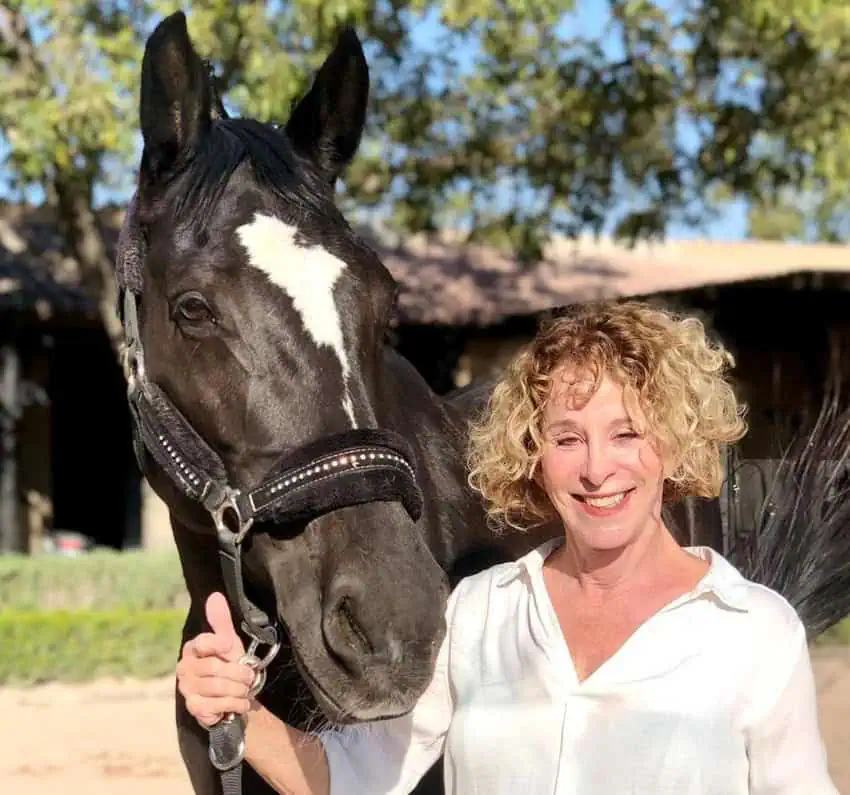
Fundraising is ongoing and headed by volunteers. “It’s wonderful how our volunteers and therapists become so invested in the project, asking to come two to three times a week to help their kids. They embrace this as if it were their own business.” says Gerber. “It is so rewarding to see the results from the therapy — to see children who were afraid of horses now become accustomed to them. The parents are telling us about the results the children are experiencing in their homes. It fills the heart. Everyone is smiling and happy.”
Equinoterapias Hossana
Founded in 2012 by Evelyn Trejo, Equinaterapias Hossana is a non-profit organization supported by the San José del Cabo-based Los Cabos Children’s Foundation. Trejo fell in love with horses at 15 years old, but as an adult, she became an accountant who worked in a government agency. While there, she learned there were many disabled children and adults in the area and no therapy available for them. She approached friends with horses, obtained some land and started her therapy center.
Their organization developed a very different method, incorporating psychologists and therapy to assess a child’s needs and develop activities to help them reach their goals.
“Some of our programs are free to children of low-income families, while others are very low cost, depending on the socioeconomic situation,” Trejo told me. “Our therapists are certified by the Mexican Association of Therapeutic Riding, and we have a psychologist, a physiotherapist and a wonderful group of teachers on our team. Equinaterapia Hossana’s goals have always been to improve children’s muscular tone and coordination and to help with their psychological attention, understanding, self-esteem and memory ability.”
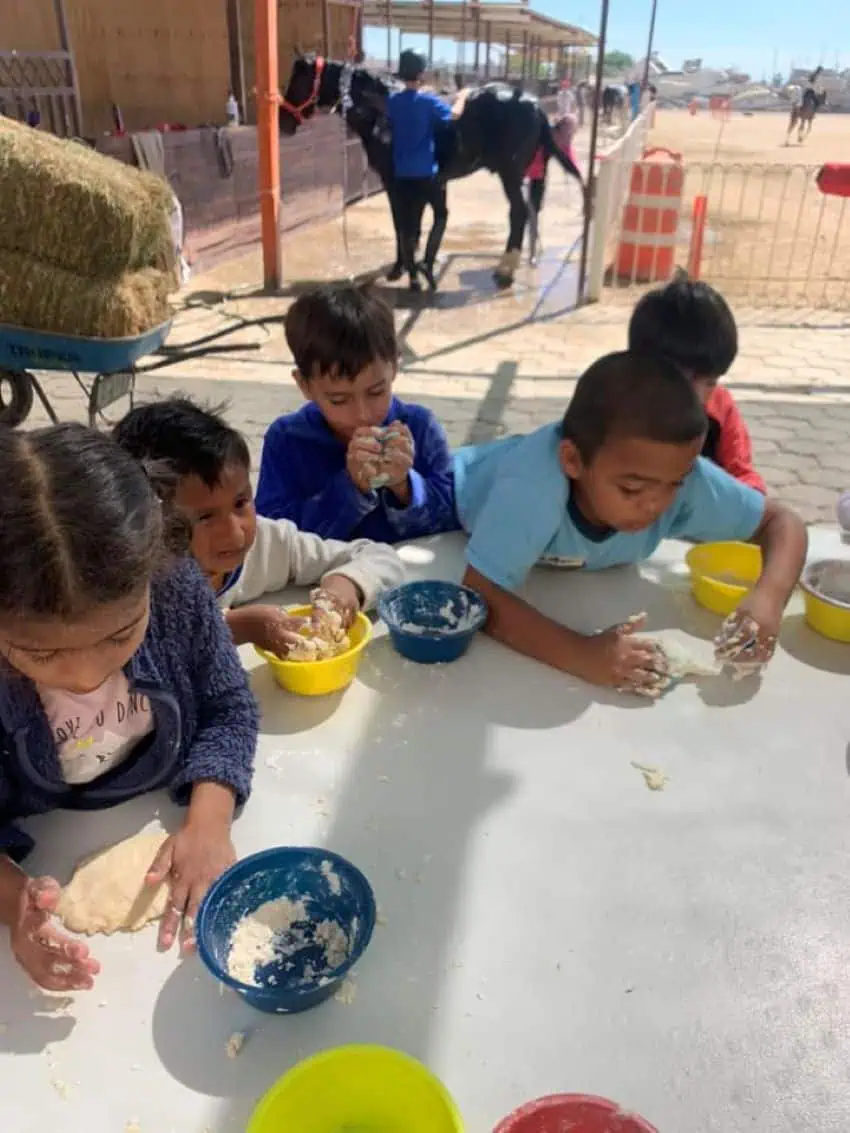
Over the years, Equinaterapias Hossana has served more than 500 children from the municipality of Los Cabos. They feel strongly they have achieved wonderful results with children and young people. But, says Trejo, “Horses are expensive and so are the professionals we work with, so we look for other ways to make money. We also have a farm, and every Saturday, we offer farm tours and allow families to tour our facilities and interact with the animals. We also offer horseback riding lessons that teach children the sport that it is.”
When asked what drew her to this line of work, she says the same thing that all three of the other women — and myself — say about equine therapy: “It’s my passion.”
The writer divides her time between Canada and Zihuatanejo.
